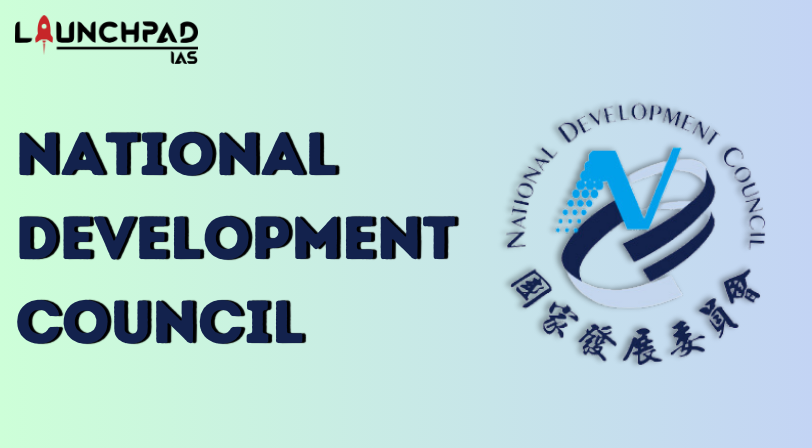- The National Development Council (NDC) or Rashtriya Vikas Parishad functions as the highest authority for decision-making and discussions concerning development matters in India, chaired by the Prime Minister.
- It was established on August 6, 1952, to consolidate and mobilize the nation’s efforts and resources to support the Five Year Plans outlined by the Planning Commission. Its objectives include promoting consistent economic policies across key areas and ensuring balanced and swift development in all regions of the country.
- The Council consists of the Prime Minister, Union Cabinet Ministers, Chief Ministers of all States or their representatives, Union Territory representatives, and members of the NITI Aayog (formerly known as the Planning Commission).
History of NDC
- The National Development Council (NDC) is India’s apex authority for approving five-year plans.
- National Development Council was set up on August 6, 1952.
- The Prime Minister presides over the National Development Council.
- The National Development Council (NDC) is headquartered in New Delhi.
- The first five-year plan was only adopted without the National Development Council’s approval.
- Jawaharlal Nehru presided over the NDC’s first meeting in November 1952.
Establishment of the National Development Council
- The National Development Council (NDC) is pivotal in India’s planning system, reflecting a federal planning approach and ensuring a holistic national outlook. NDC’s journey has witnessed fluctuations shaped by political dynamics, central government support, state pressure, and effectiveness.
- Amid challenges spanning six decades, NDC has maintained its presence in the highest policy framework. The notion of an advisory body with provincial, princely state, and stakeholder representation was introduced by the Planning Advisory Board under KC Neogi in 1946. Although pre-independence implementation didn’t occur, the idea’s significance was acknowledged.
- Perceiving the potential advantages, the Planning Commission stressed the NDC’s importance in the Draft First Five Year Plan. Given India’s vastness and states’ constitutional autonomy, establishing a body for periodic planning evaluations by the Prime Minister and Chief Ministers was deemed vital. Consequently, the NDC emerged in August 1952 following a Cabinet Secretariat proposal by the Government of India.
Structure and Appointment of NDC
- The Prime Minister, the Chief Ministers of States, and members of the Planning Commission(now NITI Aayog) are part of the National Development Council.
- The NDC members are as follows:
- The Prime Minister of India (who serves as its Chairman/Head).
- The Union Cabinet
- All state’s chief ministers.
- All Union Territories’ chief ministers and administrators.
- The members of the NITI Aayog
Objectives of the National Development Council
The NDC was formed with the following goals in mind:
- To create a nation free of exploitation and poverty
- To achieve equality, decent governance, rights, and a welcoming environment.
- To reduce violence against women while advocating for human rights, fair governance, and gender equality.
- To strengthen civil society, CBO, and UP capacities in local-level planning and management.
- Providing standard and extensive quality services wins organizational sustainability.
- To ensure state collaboration in carrying out the Plan.
- To strengthen and mobilize the nation’s efforts and resources to support the Plan.
- To support unified economic policies in all domains of government.
- To ensure the balanced and speedy growth of the entire country.
- To provide underprivileged and troubled women with advocacy and legal assistance.
Function And Mandates of National Development Council
The NDC can take on practically any national development issue. According to the Government of India resolution, the functions of the National Development Council are as follows:
- To define criteria for forming the National Plan, including the appraisal of Plan resources.
- To take into account the Planning Commission’s national plan
- Consider major social and economic policy issues affecting country growth.
- To conduct periodic reviews of the Plan’s operation and recommend steps necessary to achieve the purposes and targets outlined in the National Plan.
- To consider important issues of social and economic policy affecting national development.
- To improve the efficiency of administrative services and ensure the fullest development of less developed regions and sectors.
Powers and Authority of NDC
- The NDC’s choices have been like policy formulation. It would not be an exaggeration to describe it as the country’s highest policy-making body.
- Even though the NDC is a non-statutory advisory body that offers recommendations to the Central and State governments, the Council’s status ensures that these recommendations have the prestige of mandates, which are routinely followed and obeyed.
- The NDC is mandated to convene at least twice a year. However, it has met more frequently in the past.
- The agenda for NDC meetings typically includes the approach paper to the Five Year Plan, the draft Five Year Plan, and the final Five Year Plan.
- Other issues are added to the agenda if the central or state governments raise them.


